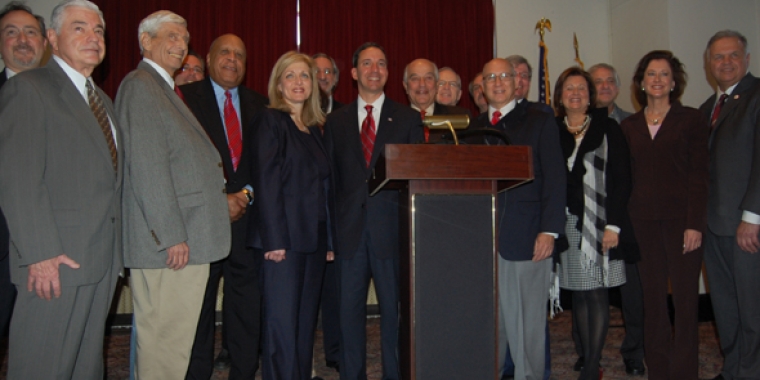Senator Martins' Bill Amending Consolidation Law Protects Villages
Jack M. Martins
May 3, 2011
-
ISSUE:
- Local Government
-
COMMITTEE:
- Local Government

A bill (S.1824) introduced by Senator Jack M. Martins that clarifies and amends the Citizen’s Empowerment Act has passed the Senate today.
In 2009, Governor David Paterson signed into law a measure that would allow people to dissolve local governments. The legislation was lobbied for by then-Attorney General Andrew Cuomo.
However, there were several problems with the law. For one, residents of a municipality would be voting via a referendum on whether to dissolve that municipality, whether it be a village or special district, without knowing what the alternative plan would be to provide services for those residents.
Under the current law, to dissolve a village or a special district, a petition with signatures of 10 percent of registered voters or 5,000 signatures (whichever is less) is needed to get a referendum to dissolve the special district or village. If approved in the referendum, an actual plan for consolidation has to be developed by the local government being dissolved.
If the residents of that district or village are dissatisfied with the plan, they can then opt to try to reject the plan through a referendum requiring the signatures of 25 percent or 15,000 (whichever is less) of the registered voters in the area effected to reject the consolidation plan.
In addition, there was no time requirement for the collection of the signatures that would trigger the dissolution process. Those who are seeking to dissolve a local village, for example, can collect the signatures over a period of years.
Senator Martins’ legislation that was passed by the Senate today clarifies the law. Under Senator Martins’ bill, anyone seeking to dissolve a local governmental entity will have 60 days to collect the signatures needed.
In addition, Senator Martins’ bill does the following:
* If a valid petition is submitted, a referendum will be held for the residents of the local government. If the referendum passes, the local governing body must formulate a consolidation plan.
* The plan must include such information as the fiscal impact of the plan, the extent to which services will no longer be provided through the use of volunteers as well as the projected change in property taxes for the taxpayers in the local government.
* Then, the residents of the local governing body to be dissolved and/or consolidated will vote on the plan, which would have to be approved by the majority of voters in order to go into effect.
* The bill would additionally amend the Municipal Home Rule Law, to require that all proposed dissolutions of local government entities initiated by a county must be put to a vote of the residents of each local government entity within the county.
“Under the current law, residents do not get to vote on the consolidation plan. They must go through the trouble of petitioning for its rejection. Under my proposed legislation, residents will have an opportunity to vote on the consolidation plan. This gives the people a greater say in their government,” said Senator Martins. ”The consolidation of any local government, whether it be a village or special district, is a serious decision. Those making it should have all the information and then should have the opportunity to vote on the consolidation plan. This bill strengthens the Citizen Empowerment Act and makes it clearer for our taxpayers,” said Senator Martins.
Senator Martins’ legislation comes after the New York Conference of Mayors, the Association of Towns, the Fireman’s Association of the State of New York and the Association of Fire Districts of the State of New York have all requested amendments that would expressly specify the procedures for consolidation and dissolving local government entities.
Share this Article or Press Release
Newsroom
Go to Newsroom
Senator Martins to Hold “Shed the Meds” Program on May 14th
April 22, 2016

Track Your Income Tax Refund Status
April 21, 2016
